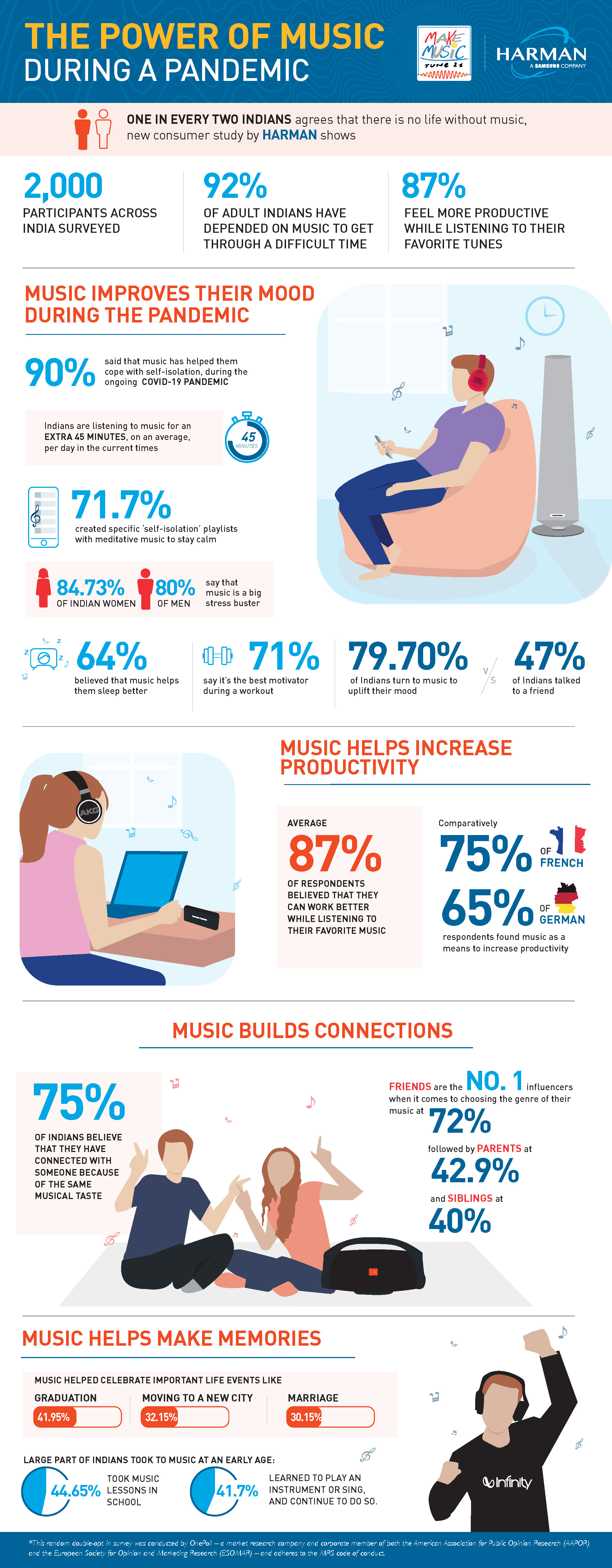One in every two Indian strongly agrees that there is no life without music, new consumer study by HARMAN shows
A survey of 2,000 participants across India, found that 92% of adult Indians have depended on music to get through a difficult time during their lives
INDIA, BANGALORE, JUNE 19, 2020: On the occasion of World Music Day, celebrated on June 21st
each year, HARMAN has partnered with OnePoll* to understand just how important music is in our lives, especially during the prevailing times.
A survey of 2,000 participants across India, found that one in every two adult Indian strongly believes that there is no life, without music. 92% Indians said they have depended on music to get through a difficult phase in their lives. 87% of respondents believed they are more productive while listening to their favorite tunes.
Specifically, respondents were impacted by music in four key areas:
Music improves their mood during the pandemic
- Overwhelmingly, 90% of all respondents said that music has helped them cope with self-isolation, during the ongoing COVID-19 pandemic.
- So much so, that Indians are listening to music for an extra 45 minutes, on an average, per day in the current times.
- 71.7% Indians have created specific 'self-isolation' playlists that include tracks that helps them meditate or have a soothing, calming effect on their mind.
- 84.73% of Indian women and 80% of men say that music is a big stress buster.
- 64% of all surveyed Indians believed that music helps them sleep better, while 71% say it's the best motivator during a workout.
- And when the chips are down, 79.70% of Indians turn to music to uplift their mood versus 47% of them talking to a friend.
Music helps increase productivity
- Does music help us to be more productive? Is there a connection between the music we listen to and the amount of output we can deliver? It sure does! In India, on an average 87% of respondents believed that they can work better while listening to their favorite music.
- The results are similar in other regions of the world. 75% of French and 65% of German respondents believed to have a positive impact on their productivity, when listening to their favorite music while working.
Music builds connections
- HARMAN's study showed that 'like minds listen alike'. 75% of Indians believe that they have connected with someone because they happen to share the same taste in music.
- Friends are the number one influencers when it comes to choosing the genre of your music at 72%, followed by parents at 42.9% and siblings at 40%.
Music helps make memories
- Survey respondents said that music has been an important part in celebrating their lives' milestones.
- Many indicated that music has helped them celebrate important life events like graduation (41.95%), marriage (30.15%) or moving to a new city (32.15%).
- The relationship of a large part of Indians with music started at an early age with 44.65% taking music lessons in school and 41.7% have learned to play an instrument or sing, and continue to do so.
“Music has been central to our culture- from rich heritage folk music to eclectic musical soundtracks in movies. But we are inspired by its profound and positive impact during challenging times on our emotional and physical health." said Pradeep Chaudhry, Country Manager, HARMAN India. “At HARMAN, with our rich legacy and years of experience with the latest audio innovations through our brands JBL, Harman Kardon, AKG, Infinity and others, we are dedicated to helping people get the most out of their listening moments and are grateful for the sublime benefits music delivers."
*This random double-opt in survey was conducted by OnePoll – a market research company and corporate member of both the American Association for Public Opinion Research (AAPOR) and the European Society for Opinion and Marketing Research (ESOMAR) – and adheres to the MRS code of conduct. For more information about OnePoll's research in the media, navigate to their portfolio here.

